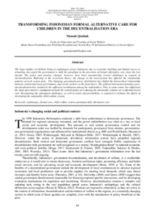Abstract
The large number of children living in orphanages across Indonesia, due to economic hardship and limited access to schooling, has urged the government to shift the paradigm in the provision of formal alternative care since the last decade. The policy and practice changes, however, have been encountering several challenges in regards of decentralisation. Referring to the ecosystem theory, the change in the macrosystem has affected the relationship patterns of each system units. The changing government power distribution has shifted the hierarchical relationship between central and local governments, and social workers as the front liners. The political interaction dynamics postdecentralisation has resulted in the sufficient coordination among the stakeholders. This, to some extent, has influenced the local government’s standpoint towards the central policy on reducing the community reliance on residential-based care. Recognising the subsequent challenges, as well as needs and possibilities, is required to enhance the efforts of developing the sustainable child welfare system.

